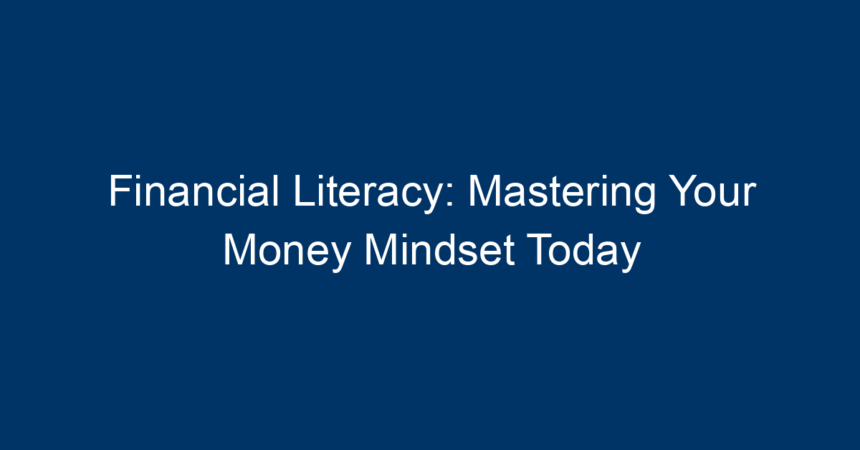In an ever-evolving economic landscape, understanding how to manage your money effectively is more crucial than ever. Financial literacy is not just a buzzword; it’s a vital skill set that empowers individuals to make informed financial decisions. With the world becoming increasingly complex, mastering your money mindset is not merely desirable—it’s essential for achieving long-term financial health and personal success. In this article, we’ll explore the fundamental aspects of financial literacy, offer practical tips, and examine how developing a positive money mindset can lead to better financial outcomes.
Understanding Financial Literacy
What is Financial Literacy?
Financial literacy encompasses the knowledge and skills that allow individuals to make informed and effective decisions regarding their financial resources. It includes understanding key concepts such as budgeting, saving, investing, and debt management. Achieving financial literacy equips you with the tools necessary to navigate everyday financial challenges and make strategic decisions that support your long-term goals.
The Importance of Financial Literacy
-
Empowerment: By being financially literate, you empower yourself to take control of your financial situation. This control fosters confidence and reduces anxiety about money.
-
Informed Decision-Making: Financial literacy helps you make smart choices—whether it’s understanding loan terms, comparing investment opportunities, or choosing the right insurance.
-
Avoiding Debt: A solid understanding of financial principles can help you avoid common pitfalls like excessive debt and poor spending habits.
- Long-term Wealth Building: Knowledge about investment options and retirement planning can set you on a path to financial independence.
Cultivating a Money Mindset
What is a Money Mindset?
Your money mindset is the mental attitude you have toward money and wealth. It encompasses your beliefs, values, and behaviors related to financial matters. Positive money mindsets can help in achieving your financial goals, while negative beliefs can hinder your progress.
Recognizing Negative Money Mindsets
Common negative money mindsets can include:
- Scarcity Mentality: The belief that there will never be enough money, leading to constant worry and poor decision-making.
- Avoidance: Ignoring financial matters out of fear or overwhelming feelings, which can result in missed opportunities.
- Feeling Unworthy: Believing that you don’t deserve wealth can lead to self-sabotage.
Developing a Positive Money Mindset
-
Self-Reflection: Identify your beliefs about money. Are they rooted in fear or abundance? Journaling can help uncover these beliefs.
-
Education: Invest time in learning about financial topics. Attend workshops, read books, and follow credible financial blogs.
-
Surround Yourself with Positivity: Engage with people who have a healthy relationship with money. Their attitudes can influence your own.
- Set Clear Goals: Having specific financial goals gives you direction and motivation to improve your financial literacy.
Important Aspects of Financial Literacy
Budgeting: The Foundation of Financial Management
A budget is a financial plan that helps you allocate your income towards expenses, savings, and investments. Here’s how to create an effective budget:
-
Track Your Income and Expenses: Use tools or apps to keep an accurate record of where your money goes.
-
Set Realistic Limits: Determine how much you can afford to spend in various categories, including necessities and discretionary expenses.
- Review and Adjust: Regularly assess your budget and make alterations based on your changing financial situation.
Saving: Building a Safety Net
Having savings is critical in achieving financial stability. Here are some strategies:
-
Emergency Fund: Aim to save at least three to six months’ worth of living expenses in a separate account.
-
Automatic Savings: Set up automatic transfers to your savings account to ensure you are consistently saving.
- Short-term and Long-term Goals: Differentiate between immediate savings needs and future investments or purchases.
Investing: Growing Your Wealth
Investing is a powerful way to build and grow your wealth over time. Here’s what you should know:
-
Understand Different Investment Vehicles: Familiarize yourself with stocks, bonds, mutual funds, and real estate.
-
Risk Tolerance: Assess your comfort level with risk to determine the right investment strategy for you.
- Diversification: Don’t put all your eggs in one basket—spread your investments to minimize risk.
Debt Management: Taking Control
Managing debt wisely is critical to financial literacy. Here’s how to handle debt effectively:
-
Know Your Types of Debt: Differentiate between good debt (like mortgages) and bad debt (like high-interest loans).
-
Prioritize Payments: Focus on paying down high-interest debt first, while making minimum payments on lower interest loans.
- Explore Consolidation Options: If you have multiple loans, consider debt consolidation or refinancing to lower your payments.
Actionable Insights for Enhancing Financial Literacy
-
Set Educative Goals: Aim for continuous learning by reading books specifically about financial literacy and managing personal finances.
-
Leverage Online Resources: Utilize online platforms like Coursera, Udemy, or Khan Academy that offer courses on financial literacy.
-
Join Community Discussions: Engage in local community groups or online forums focused on financial education to exchange knowledge.
-
Utilize Budgeting Tools: Consider apps like Mint or YNAB (You Need A Budget) for easier financial tracking.
- Consult a Financial Advisor: For personalized guidance, consider hiring a financial advisor to help create a tailored financial plan.
Conclusion
Mastering financial literacy is a journey that begins with cultivating a positive money mindset. By understanding the principles of budgeting, saving, investing, and managing debt, you are not just preparing for a secure financial future—but also empowering yourself to achieve your dreams. In today’s complex financial landscape, taking the time to enhance your financial literacy is an invaluable investment in your personal success. So, embrace the opportunity to learn, adapt, and grow—because financial mastery is within your reach. Start today, and take the first step towards a financially literate and empowered future!




